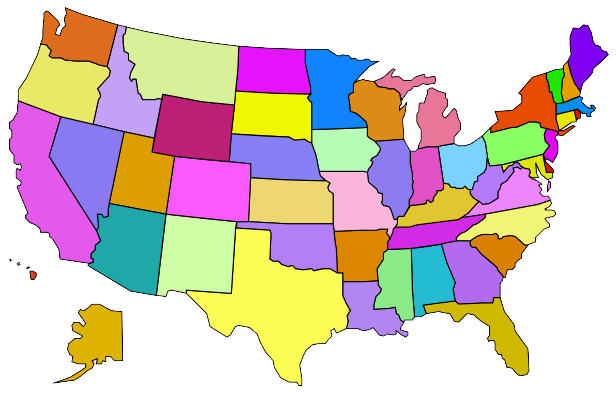A Brief History of AOSA
The American Orff-Schulwerk Association (AOSA) was founded in Muncie, Indiana on May 11, 1968. Its formation was the result of ten passionate and dedicated music teachers who recognized the value and potential of the Orff Schulwerk music and movement pedagogy developed by Carl Orff (1895-1982) and Gunild Keetman (1904-1990). The AOSA founders acted in hopes of organizing the excitement that was building for this approach, which was spreading across the country, and to promote its implementation in American music education. Known as the Orff Schulwerk Association (OSA) until 1970, AOSA grew from ten founding members to 332 in its first year. Seven chartered local chapters expanded through the years to more than 96 today, with current membership at approximately 3,300.
In 1976, the Gunild Keetman Assistance Fund was established to provide scholarships to members for professional development or special creative projects that are associated with Orff Schulwerk. The Harriet Evans Shields Scholarship, renamed the Shields-Gillespie Scholarship Fund in 1991, was established to provide financial assistance for teacher education, instruments, or other special creative projects associated with Orff Schulwerk that benefit the music education of children. AOSA published the first guidelines for Orff Schulwerk teacher education in the U.S. in 1976 and, beginning in 1982, began publishing an approved list of certification courses across the country that met these guidelines. Today, AOSA-approved teacher education courses can be found throughout the United States.
The Orff Echo, AOSA’s quarterly publication, first appeared in November 1968 as a four-page bulletin. Since that time, it has evolved to its current journal format, which includes scholarly research articles. The association’s quarterly newsletter, Reverberations, was first published in 1995, and initially, was included as an insert to The Orff Echo. In 2001, Reverberations became a separate publication that was mailed to members’ homes. As of spring, 2011 Reverberations became an online newsletter.
AOSA has maintained a Web site since 1995 (www.aosa.org), where members can now find information on Orff Schulwerk and music education advocacy, apply for scholarships and grants, register for the national conference, connect with a local chapter, look for approved teacher education courses, and make donations. The Isabel McNeill Carley Library, established in 1985 and located at the Eastman School of Music’s Sibley Library since 2002, holds research materials, letters, and the archives of AOSA.
The AOSA Professional Development Conference, known also as the “national conference,” occurs every November in a different U.S. city. The conference was first held in 1969 at Ball State University in Muncie, Indiana, with approximately 170 participants from 21 states and Canada. Today’s conferences bring together nearly 1,500 teachers from across the U.S. and from many other countries around the world. Since 1989, AOSA has been affiliated with MENC: the National Association for Music Education, and, in addition, has been an affiliate of the Orff-Schulwerk Forum in Salzburg, Austria since 1990.
For more information about AOSA:
Cole, Judith. “Milestones in the History of Orff Schulwerk in the United States.” The Orff Echo, Vol. XLI, No. 4 (Summer 2009), pp. 27-30.
American Orff-Schulwerk Association Founding Members
(in alphabetical order)
- Arnold E. Burkart
- Isabel McNeill Carley
- Norman Goldberg
- Ruth Pollock Hamm
- Joachim Matthesius
- Elizabeth Nichols
- Jacobeth Postl
- Wilma Salzman
- Jacques Schneider
- William Wakeland
Arnold Burkart
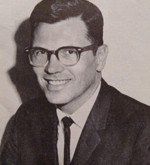
Arnold Burkart
In the spring of 1963 Arnold Burkart attended a regional MENC meeting where he first heard a recording of an Orff ensemble. What he heard inspired him to attend the second North American Orff workshop that summer in Toronto where his teachers were Doreen Hall and Hugh Orr. Burkart was captivated by the Orff approach. He once recalled that this was one of the most exciting times of his life. Arnold returned to California and began infusing the Orff approach in the music programs he supervised. History was in the making. It was only five years later, on May 11, 1968, that the American Orff-Schulwerk Association (AOSA) was founded, and Arnold Burkart was elected the first President of the organization.
Burkart started his teaching career as an elementary and middle school music specialist in California. In 1967 Arnold moved to Indiana to teach music education courses at Ball State University. In December of that same year, Burkart sent a letter to several Midwest educators involved with the Orff Schulwerk movement. One of his purposes was to invite them to “a weekend convocation of all of us who are active in seriously promoting the use of Orff Schulwerk philosophy and methodology…” Response to the letter demonstrated the vitality and strength of the Orff Schulwerk movement, small as it was at the time.
An all-day planning session was arranged for May 11, 1968, at Burkart’s home in Muncie. Just five years after this historic meeting, the organization had grown from the original ten founding members to nearly 1,200 members representing 49 states and several Canadian provinces. Arnold Burkart served as AOSA president for two years. He became Executive Secretary in 1970, and went on to publish a magazine series called Keeping Up with Orff-Schulwerk in the Classroom. This publication continued for ten years and emphasized curriculum ideas according to the Schulwerk approach. Burkart continued to advance the growth of the Schulwerk by teaching workshops across the United States as well as in Canada, Austria, Germany, Hungary, France, England, South Africa and Taiwan. Additionally, Arnold taught at the Orff Institute in Salzburg for several summers.
The scope of his work, both in this country and abroad, is truly impressive. These days, Arnold Burkart is retired but leads an active life in Florida. In his words: “Where Orff-based music education is happening – there’s where exciting things occur.”
Isabel McNeill Carley
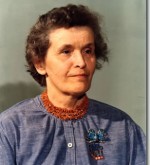
Isabel McNeill Carley
For Isabel Carley, who edited the AOSA Orff Echo for 15 years and transformed it from a slick newsletter to a professional journal, and for whom our AOSA library is named, Orff Schulwerk began with a mysterious German book and a xylophone. As Isabel recounted the story, German friends who lived in the U.S. returned from European travels during the late 1950’s with an alto xylophone and a copy of Volume I of the German edition of Music for Children. At that time in Indianapolis Isabel maintained a private music studio where she taught three levels of music classes for children along with private recorder and piano lessons and adult recorder classes. She, her husband James, and their three children performed regularly as the Carley Consort. The Schulwerk was largely unknown in the U.S. Isabel McNeill Carley found her friends’ xylophone and book “both perplexing and tantalizing.” She ordered a copy of the book for close study. When she read an announcement for the 1962 Toronto Orff Schulwerk course, she enrolled. The two weeks of classes with an Orff conference sandwiched between them excited Isabel. Decades later she remembered sessions vividly. Carl Orff, Gunild Keetman, Wilhelm Keller, Barbara Haselbach and Lotte Flach had come from Europe to teach along with Arnold Walter, Director of the School of Music at the University of Toronto, and Doreen Hall of the Toronto faculty. Isabel met colleagues in Toronto who later became leaders of what she referred to as “the Orff movement.”
The Orff emphasis on ensemble attracted Isabel. She was fascinated by the rhythm instruments, the unfamiliar barred instruments, and rhythmic training with speech. In particular, supporting the valuable learning that can come from improvisation appealed to her. She returned to Indiana determined to teach music with Orff instruments instead of piano.
Drawing upon her college German, Isabel spent the year 1963-64 studying at the Salzburg, Austria, Mozarteum’s Orff Institute, the first year of its existence. She participated in 36 hours of classes weekly, three daily hours of movement, nothing in English. She recalled that among other faculty Orff and Keetman taught the group from time to time. Isabel was grateful to have private composition lessons from Carl Orff by his invitation. She completed the elements of the three-year teacher education program of the Orff Institute in one year and earned her certificate with honors.
Isabel has taught countless workshops, AOSA conference presentations, and summer Orff certification courses, including 12 summers at Denver University and five summers at the Florida State University Orff program, which she directed. She is especially known for recorder, for her work with Orff improvisation and arranging, and for her instruction using traditional American and British folk sources for modal music, rhythmic speech, and children’s music/movement games. She has published Orff instructional materials including a unique series of books for teaching recorder through improvisation, Recorder Improvisation and Technique (Brasstown Press), as well as recorder consort music, piano music for children, anthems for junior and youth choirs, solo suites for recorder and piano, and original suites for recorder ensembles. Her editorial essays about Orff Schulwerk that appeared in the Echo over the years raise timeless issues about the theory and pedagogy of the Orff approach. Many of them can be read in Volumes I and II of Orff ReEchos: Selections from the Orff Echo and the Supplements (1977 & 1985), which Isabel and the Echo editorial committee edited.
Norman Goldberg
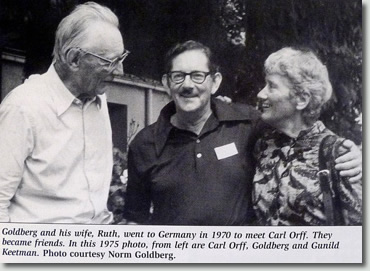
Norm Goldberg (center)
In her portrait series exposé on Norman Goldberg, Pam Hetrick states quite eloquently that “Norman Goldberg is many things to the American Orff-Schulwerk Association. He is one of its founding members, was named an Honorary Member in 1984, received the first AOSA Industry Award in 1998, was recognized in 2003 for his perfect attendance at all of AOSA’s annual national conferences, distributed Studio 49 instruments for more than three decades and has been a steadfast friend and supporter of Orff Schulwerk since its beginnings. The integrity of our association owes much to this energetic, hard-working, sincere and insightful man.”
Norman Goldberg began his teaching career in Missouri in 1942. He went on to teach orchestra for four years at University City High School in the St. Louis area. In 1948, Goldberg began his business, Baton Music, with the store in the back of his car. Sixteen years later, Baton Music had become MMB Music, and was the biggest dealer of Sonor instruments. Over time, MMB Music also became the U.S. agent for Studio 49 Orff instruments. Norman first heard of Orff Schulwerk in 1962 when he attended an MENC conference in Chicago. There he saw a presentation with Doreen Hall, Grace Nash and Children from the Music Center of the North Shore. Inspired by what Goldberg called an “important direction in music education,” he started organizing Orff Schulwerk workshops in the St. Louis area. Over the next several years, Norman would attend numerous North American music education conferences and symposia. He met and befriended many Orff Schulwerk pioneers, including Arnold Burkart at the first Bellflower Symposium in 1967. On May 11 1968, Goldberg was one of the ten AOSA founders present at Burkart’s home in Muncie, Indiana.
Norman had the opportunity to meet Carl Orff in 1970. “He was a warm, kind and gentle man,” Goldberg recalled. Around this time, MMB Music joined with Schott in a joint venture to distribute the English edition of Volume 3, The Schulwerk, of Carl Orff’s autobiography. MMB had also become one of the only distributors of music therapy materials. From 1997-1998, Norman was instrumental in facilitating collaboration between AOSA and the American Music Therapy Association (AMTA). Today music for all ages as well as music therapy is an integral part of Orff Schulwerk conferences. Norman Goldberg continues to promote music, education and peace around the world through local and international projects. “We have to do anything we can to help promote peace in the world,” he said. “Music is life, and life is music.”
Ruth Pollock Hamm
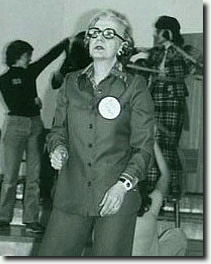
Ruth Pollock Hamm
During the summer of 1960, the first two volumes of Orff-Schulwerk: Music for Children, (Margaret Murray editions) were purchased as a gift for Ruth Pollock Hamm who immediately became interested in the fascinating use of poetry, words, and sound gestures. Ruth’s exploration of the Schulwerk had begun. Soon after, Hamm had the good fortune of experiencing Doreen Hall’s instruction during the summer of 1961, and Gunild Keetman’s expertise the following summer at the 1962 Schulwerk Teachers’ Course at Photo: Ruth Pollock Hammthe Royal Conservatory of Music, University of Toronto. In addition to Keetman, the conservatory arranged to have Carl Orff and others from the Orff Institute as headline attractions for the summer course and mid-session conference. Between July 16 and July 24, 1965, Ruth attended the Orff Institute’s first English-speaking Schulwerk training course under the direction of Margaret Murray. Course instructors in addition to Murray included Dr. Hermann Regner, Wilhelm Keller, Barbara Haselbach, Walter Bergmann, and Polyxene Mathéy, from Greece. These many years of training greatly shaped Ruth as a music educator and leader in the Orff Schulwerk movement.
Ruth Hamm was employed as an elementary school music specialist in the Shaker Heights Ohio School District, from September, 1950 until the end of January, 1977, when she retired from public school teaching. Concurrently, Hamm taught Orff Schulwerk in a studio environment at the Cleveland Music School Settlement, from the fall of 1963 to the end of the 1968 school year. During this same time period, Ruth had begun teaching adult Schulwerk courses also. She had also demonstrated her strength as a writer, a skill that would help influence and inform educators to the present day through numerous articles, reviews, and other publications. Hamm later asserted in one of her articles that the participation, excitement, satisfaction, and enjoyment of the children were the most remarkable outcomes of the Schulwerk experience.
In December of 1967, Arnold E. Burkart, newly appointed music education professor at Ball State University, sent a letter to several Midwest educators involved with the Orff Schulwerk movement. His purpose was to invite them to an idea sharing meeting and to also gauge potential interest in organizing a national group dedicated to the Schulwerk approach. Response to the letter demonstrated the vitality and strength of the Orff Schulwerk movement, small as it was at the time. An all-day planning session was arranged for May 11, 1968, at Burkart’s home in Muncie. At the meeting the newly selected steering committee unanimously decided that a professional organization would add strength to the movement, and the Orff-Schulwerk Association (OSA) was officially founded that day. Ruth Pollock Hamm was invited to attend this historic meeting but a Schulwerk workshop she was presenting that same weekend prevented her from attending. Despite this absence, Hamm was elected to the OSA board of directors and eventually assigned to the membership and publicity committees. Ruth continued to serve national AOSA as vice-president and conference chairperson (1970-1972), president (1972-1974), and executive secretary [director] (1974-1980).
Joachim “Joe” Matthesius
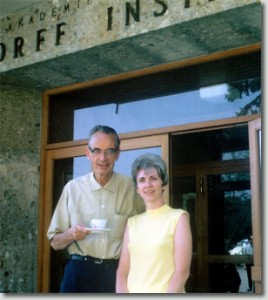
Joachim Matthesius
Thousands of AOSA members fondly remember tall, slender Joe Matthesius drawing a resonant, ringing, ritual rendition of our beloved Praetorius canon, “Viva la Musica” from the participants at annual conferences in the 1970’s and 1980’s. At such times Joe, German-born but American through and through, seemed to be the embodiment of the heart and soul of our organization. Humble and dedicated, Joe was not a music educator, but, rather, the principal of an elementary school in Ferndale, Michigan, when he discovered Carl Orff’s approach to music education. He had always been interested in music as a lay person, having studied voice, piano, guitar and recorder. He had sung in choirs and had conducted a Detroit madrigal group.
Like several other AOSA founders, Joe saw an announcement of the 1962 summer Orff workshop at the University of Toronto that brought the Schulwerk from Germany to the U.S. He registered, and the experience of working with Carl Orff, Gunild Keetman, Barbara Haselbach and Wilhem Keller that summer transformed his thinking. Demonstrations with children made it possible to picture what the approach could mean to students’ learning and social development. As Joe said, “The thing that struck me the most was the spirit of the participants and staff – the power, the feeling of the group.” Through Barbara Haselbach he made the discovery that music and movement are part of the same thing, “that movement is another way to express music, that movement well done is visible music.”Joe Matthesius and Peg Van Haaren
When Joe left Toronto he began to work with Michigan fifth graders in his school, the Best School, named for Paul Best, during lunch hours. He used the kinds of activities that he had experienced in Canada, emphasizing, as he recalled over two decades later,”rhythm, speech, body percussion, movement, and singing.” In 1962, acquiring Orff instruments in the U.S. was challenging, and when Joe sent for a set of Studio 49 instruments from Germany the order was held in a U.S. customs warehouse, because the officials did not know what it was. Eventually somebody at the customs site got the idea of labeling the boxes (inaccurately) “organ parts,” and sending them on to Michigan. They arrived around Easter of 1963. Joe never looked back; his protégés were ready to perform for the public by February of 1964. Not mere concerts, the demonstrations they offered were for school principals and teachers in a Detroit metro-wide group called the “Elementary School Improvement Committee.” Modestly, Joe recalled that there were “favorable comments.” He was pleased that some schools began Orff Schulwerk programs after they had experienced his students. Peg Van Haaren, an AOSA member instrumental in the origins of both AOSA and the Detroit Orff Chapter, recalled that parents came to Joe to ask about his music activities, and that he responded to the interest by convincing his school district to allow him to offer an Orff Schulwerk night class for interested adults. Participants in that group included Carolyn Tower, Connie Heidt, and Claire Levine, who all became engaged in AOSA and Orff Schulwerk.
After facilitating Orff activities with children for a few years, in 1965 Joe took a summer course at the Orff Institute in Salzburg. He returned to Michigan determined to do more with movement and speech activities in his Orff groups. He enjoyed sharing his students’ accomplishments; the joy was not only in the beauty of the music and movement that the children developed, but also in the warm friendship among all the members of the group. Like Orff, Joe did not try to convert uninterested teachers, because he believed that Orff Schulwerk requires a teacher who is comfortable with children’s spontaneous contributions and with improvisation, a teacher who does not try to set up every aspect of a lesson in advance. Not all teachers wish to operate in this manner. Peg Van Haaren recalled that Joe and Joan Lumsden, an elementary music teacher from Highland Park, Michigan, who had been a student in Joe’s night class, both understood that many children in the Detroit area were challenged by poverty and easily discouraged about school and life. The two responded to this by establishing for these children what they called, “The Saturday Group.” The group met in Lumsden’s school every week, and then went to an established nearby camp setting for summer “Orff Camp.” The Saturday Group gained recognition when it performed at the 1975 AOSA Conference in Detroit.
In 1968 when Arnold Burkart invited him to attend the first organizational meeting that led to the founding of AOSA, Joe enthusiastically joined the initiative, and served as the second national AOSA president following Arnold Burkart. According to the hardworking Orff-enthusiasts who established our organization, Joe as a non-music-educator was able to contribute the perspective of an administrator, invaluable in those early days. Joe felt that children, especially kids who are not in elementary school band or orchestra, need Schulwerk, because, “it is the only logical and really successful introduction for children into the world of music.”
When Peg Van Haaren in 1969 participated in the summer course at the Salzburg Orff Institute, she found fellow Detroiter Joe Mathesius there. During a coffee break, Joe turned to her and said, “Peggy, we must try to gather people interested in Orff and share ideas.” The picture in this spotlight feature shows the two, coffee in hand, in front of the Orff Institute, just after they agreed that when they returned to Michigan they would do this. They did so with great success, beginning in the subsequent fall, 1970. Five years later Detroit hosted the 1975 AOSA annual conference with Peg as conference chair; in Detroit, DOSA celebrated its 40-year anniversary during the past year.
After Joe met Carl Orff in Toronto in 1962, where, fluent in German, he did some translating for Orff, the two corresponded regularly. Carl Orff took a great interest in the activities of AOSA and would send greetings to us in the organization through letters which Joe would read aloud at AOSA conferences. Joe had family in Germany, and with his wife, Charlotte, he visited there frequently in summers. When in Germany, he would visit with Carl Orff and his wife, Liselotte. Peg Van Haaren believes that this connection between Orff and an American, who knew German, loved to correspond, and had a good sense of the kinds of stories that would illustrate the Orff Schulwerk approach with children in the U.S., had a great deal to do with Orff’s enthusiasm about the work here and the development of AOSA.
Sources:
Osterby, Patricia. Orff Schulwerk in North America, 1955-1969. Ed.D. diss., University of Illinois at Urbana-Champaign, 1988.
Van Haaren, Margaret. Personal communications July, 2009 and June, 2010.
Elizabeth Nichols
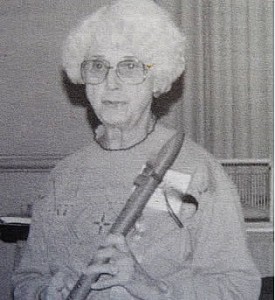
Elizabeth Nichols
Elizabeth Nichols” encounter with Orff Schulwerk offered her an avenue for personal and professional development at a crucial time in her life. Nichols stated in 1994 that “It continues to be an integral part of my life today and a source of lasting friendships.”. In 1962, Elizabeth was introduced to the Orff approach by her friend, Barbara Grenoble. Shortly after, Nichols attended summer workshops at Ball State Elizabeth NicholsUniversity in Muncie, Indiana. There, Elizabeth met co-founder Isabel McNeil Carley and studied under Lotte Flach from the Orff Institute in Salzburg. After Ball State, Nichols returned to her home state of Colorado where she established a complete Orff program at the Colorado Academy for Boys in Denver. In 1966, Elizabeth was off to study at the Orff Institute. En route, she visited the Studio 49 factory in Munich, Germany. Upon her return to the United States in 1967, Nichols took a position as education consultant with MMB Music which held the American franchise for selling Studio 49 Orff instruments. MMB was owned by AOSA co-founder Norman Goldberg and his business partner, Ted Mix.
Also during the summer of 1967, Elizabeth Nichols accepted a position at Ball State University (BSU) where co-founder Arnold Burkhart had also been hired. Nichols states, “This was a step into the college mainstream of music education and placed me, inadvertently, in the right place at the right time.” With the founding of the American Orff-Schulwerk Association, Elizabeth filled the initial term of secretary, and from 1969-1984 served on the editorial board of the Orff Echo with Isabel Carley as editor. Nichols went on to produce the two volume Orff Instrument Source Books for the Silver Burdett Co. as complements to their elementary music series. The Source Books made connections in English-speaking countries including Canada and South Africa, and resulted in Elizabeth being invited to both lecture and conduct workshops in those countries. During her 20-year tenure as associate professor at BSU, Elizabeth also presented Orff workshops in colleges and universities in 27 states as well as at AOSA conferences. Nichols retired from BSU in 1985 and returned to her Kansas roots by moving to Topeka.
Retirement from BSU and AOSA did not slow Elizabeth down. She remained active by creating a performing consort with four other musicians. Her flute and recorder playing led her to discover the Native American flute. Nichols quickly discovered that Carl Orff”s concepts based on primitive music transferred readily to the instrument. After a move to Colorado Springs, Elizabeth developed a Native American flute program, the CD Coyote Songs and Tales, and an accompanying Orff guide for activities in art, music, dance and drama. Nichols is now content to polish her writing and poetry, aware of Orff”s emphasis on the rhythm and musicality inherent in words. Elizabeth Nichols returned to Kansas once more in 2003, where she continues to focus on the years ahead.
Jacobeth Postl
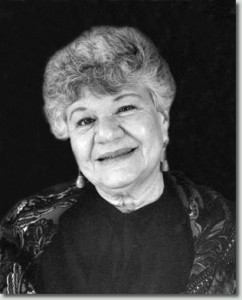
Jacobeth Postl
Jacobeth Postl’s dynamic smile and twinkling eyes have led countless students, both children and adults, through enticing movement, speech and musical Orff activities. She discovered Orff Schulwerk in 1961 at a one-week workshop held by Canadian Doreen Hall at the Music Center of the North Shore in Winnetka, Illinois. Jake recalled, “It was a basic course, not a level, but an introduction to the elements of speech, singing, and instrumental playing – basic, simple materials….I was just utterly taken and so excited about it that I went to my principal.” She had just been hired to teach in the Skokie District 68 before Doreen Hall”s course. Her exuberant description of the Orff approach won her principal over, and together they sent an order to Studio 49 in Germany for instruments, which took six months to arrive.
Decades of active involvement in Orff Schulwerk followed after Jake immediately used the 1961 Orff workshop activities along with her undergraduate Dalcroze training for teaching the children of her new teaching position. She followed the year”s teaching with studies at the renowned 1962 and 1963 Orff Schulwerk courses at the University of Toronto Royal Conservatory of Music. The Toronto courses were followed by Jake’s participation in the 1964 and 1965 summer courses at the Orff Institute in Salzburg, Austria.
Jacobeth PostlGunild Keetman, who accompanied Carl Orff on his 1962 visit to North America, was an especially influential teacher to Jake, who considered her the highlight of the 1962 Toronto course. Jake recalled, “in spite of the fact that she did not speak English, the quality, the dynamics, the personality of this woman were such that I was absolutely and totally mesmerized…. In 1962, when everything was cruising past us a mile a minute and everything still seemed so new to us (even though we had some experience with Doreen [Hall] previously), things were by no means what we would call sequenced. A great deal of the material that Keetman did was quite difficult….Most of us had very little experience with body percussion, or with memory retention through earwork! We have all developed over the years, so I’ve seen a tremendous change in what people can do! But that wasn’t true at that time. We had two left feet and four left thumbs. I think Keetman was probably taken aback with our lack of aural skills. We were so visually oriented.”
In 1963 Polyxene Mathay from Greece was the special guest educator in Toronto. Jake stated, “Mathay symbolizes all the best of what Schulwerk represents to me. In addition to her fine musicianship, she was a superb teacher and she was an absolutely wonderful, approachable, sympathetic human being.”
During the 1960’s, Jake Postl was involved in developing an Illinois State Gifted Program in connection with the gifted program in her school district. Jake and Lillian Yaross thrived on a flourishing teaching collaboration that led them to engage in a decades-long treasure hunt for engaging folk material which they collected using ditto and mimeograph masters and imparted to children and adults. By the late 1960’s Jake and Lillian were teaching teachers in response to the avid interest that the children’s demonstrations had evoked. Successful series’ of free Saturday morning classes were followed by implementation of a week-long Orff summer course in 1967 at Chicago’s DePaul University, followed by two-week Orff courses there for 28 years.
In 1968 Jake responded to Arnold Burkart’s invitation to the founding meeting of AOSA in Indiana, where plans were developed for a convocation, what later became known as an AOSA conference. In collaboration with Wilma Salzman, Jake drafted the AOSA constitution, and shortly thereafter she became the first treasurer of AOSA. The first AOSA conference followed in 1969. In the early days the AOSA vice president organized the year’s conference, but Jake had double duty in her 1974-75 term as AOSA’s vice president and conference chair. She recalled later, “They decided to have two conferences in the same year — one for the east coast members and a second for the west, because they [AOSA] had become too big. It didn”t work, because everyone came to both!” In 1976 Jake served as AOSA president, and besides teaching Certification Levels and workshops and regularly presenting at national conferences, she served for many years on the Orff Echo editorial committee.
From Jacobeth Postl’s perspective, the Orff Schulwerk took root, grew and blossomed during a time of committed state and national funding for gifted education and pedagogical innovation in the U.S. She commented, “I don”t think the movement would have developed in the way it did if it had come over [from Germany and Austria] in today”s period of conservative accountability in education. It flourished because of the time in which it was introduced. I”m grateful for the 1960s….If it survives, and I truly believe it will, it will probably take a different direction than what was originally envisioned. But that is OK. Change is as inevitable as life itself, and we must celebrate that.”
Wilma Salzman
By Mark Francis
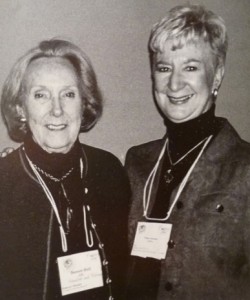
Doreen Hall (l) and Wilma Salzman
To have studied the Schulwerk under the direction of Carl Orff, Gunild Keetman, Margaret Murray or Doreen Hall is an experience few Orff Schulwerk educators can claim. Wilma Salzman, however, was fortunate enough to be in Doreen Hall’s Elementary Music Methods Class during her 1962-63 senior year at the University of Toronto. Wilma once stated that Hall so inspired her that she decided to enroll in the Orff Summer Session there and at the Orff Institute in Salzburg for 1963-64. At the Institute, she joined classmates Danai Gagne, Martha Wampler, and AOSA co-Founder, Isabel McNeill Carley. Salzman was again fortunate to be taught by Orff, Keetman, Wilhelm Keller, Hilde Tente, Traude Schrattenecker and Barbara Haselbach.
Upon her return to the United States, Wilma Salzman moved on to succeed Grace Nash at the Music Center of the North Shore in Chicago. In 1967, the Bellflower Conference in California came calling. Salzman, Nash, AOSA co-Founder Arnold Burkhart and Wilhelm Keller were invited to be panelists. Shortly thereafter, Burkhart sent his historic letter inviting Wilma and many other Orff Schulwerk pioneers to Muncie, Indiana where AOSA was founded on May 11,1968. Salzman and co-Founder Jacobeth Postl wrote the first draft of the constitution for the newly formed organization. Wilma, and her husband Michael, were then influential in the founding of the Middle Tennessee Chapter of AOSA, followed by the now defunct West Texas Chapter in El Paso.
During the years that followed Muncie, Wilma Salzman taught the Orff approach at schools in Tennessee and Texas respectively. In the summers of 1973 and 1976 she served on the faculty of the University of Toronto Orff-Schulwerk Teacher training course. Wilma continued to present workshops across the United States and Canada throughout this period of her career. In 1978, Salzman began an additional career as an ESL (English as a Second Language) teacher. This professional path led to her to create the very successful publications Big Books for Little Kids. The purpose of Big Books for Little Kids was to introduce music in the classroom under the guise of reading. Wilma and Michael continued this endeavor over the next twenty years. During this time, the Salzman’s also established the Table Top Press publishing company. Table Top Press is still operated by Salzman today. The Orff philosophy has been an integral part of Wilma Salzman’s life, and the resulting friendships she has formed over the years have been meaningful. In 1993, Wilma writes in the Orff Echo that, “It’s been a most rewarding 30 years with Orff friends old and new from across the country.”
Burkart, Arnold E. The American Orff-Schulwerk Association: The First Five Years. Supplement No. 2, American Orff-Schulwerk Association, 1973
Burkhart, Arnold. “AOSA Founders and Visionaries – Wilma Salzman,” The Orff Echo 26, no. 1 (fall 1993).
Tower, Carolyn. “Portrait Series: Wilma Salzman,” The Orff Echo 39, no. 1 (fall 2006).
Osterby, Patricia. Orff Schulwerk in North America, 1955-1969. Ed.D. diss., University of Illinois at Urbana- Champaign, 1988.
Jacques Schneider
No Bio
William Wakeland
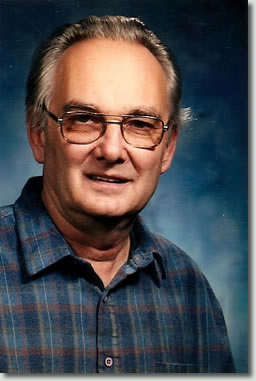
William Wakeland
On Saturday, May 11, 1968 eight people with a shared vision came together in the kitchen of Arnold Burkhart, a Ball State University professor, and formed what is now known as the American Orff-Schulwerk Association. In this group were many that have continued to hold office and be leaders in this movement. Present at this event were Arnold Burkart, Norman Goldberg, Joachim Matthesius, Elizabeth Nichols, Jacobeth Postl, Wilma Salzman, Jacques Schneider, and William Wakeland. Photo of William Wakeland
William Wakeland played a unique role in the early days of Orff Schulwerk in the United States. Unlike other founders who were involved in elementary music education or teacher preparation, Wakeland joined the Orff movement through a different avenue. Wakeland, a choral music educator, was hired by Ball State University in the spring of 1964 for the 1964-65 school year. Ball State University had pioneered a two-week workshop on Orff Schulwerk in the summer 1963, administered by Candace Ramsey, an elementary music teacher at the university sponsored Burris Laboratory School.*
The first Ball State University course found success and was taught by an instructor from the Salzburg Orff Institute, Lotte Flach. Following the first workshop, Ramsey left Muncie to be married leaving the fledgling program and newly purchased instruments. A Ball State faculty member, Ken Robinson, took over the course for one year before moving to another institution. Wakeland was then asked to take on the administration of the Orff workshop beginning in the summer of 1965. Knowing that this program would be his responsibility, Wakeland participated as an observer in the second Ball State course in 1964. Robert Hargreaves, Chair of the Ball State School of Music, asked Wakeland for ideas of how to make the program more successful. Although an outsider to Orff Schulwerk, Wakeland had a pragmatic sense of what would help the course move forward. In the fall of 1964 Wakeland suggested that Ball State offer multiple levels of training in order to strengthen both the financial feasibility and pedagogical sequence since they were bringing in international teachers from the newly formed Orff Institute. In the summer of 1965 Ball State offered three levels of training over a four-week period. Orff Workshop I was held for the first two weeks, followed by Orff Workshop II in weeks three and four. During all four weeks a more advanced seminar was also offered entitled, Applications of Orff-Schulwerk in American Schools.
Wakeland also suggested that a demonstration class with children be incorporated into the training. The advanced seminar students participated with the children while working on practical applications in the classroom. While Wakeland did not serve as a teacher in the course, under his administration the Ball State program grew to a total of 143 registrations in one summer at its peak.
Arnold Burkart joined the Ball State faculty in 1967 and became part of the summer Orff workshop, although Wakeland maintained the role of administrator of the program for several more years. This collaboration began a lifelong friendship between Wakeland and Burkart. Although Wakeland did not continue to be involved in Orff Schulwerk, his vision and stable leadership strengthened the Ball State summer workshop and contributed to the founding of the American Orff-Schulwerk Association in Muncie, Indiana in 1968 and first convention/convocation in 1969.
In addition to nine years with the Ball State Orff Schulwerk program, Wakeland maintained an active schedule as a choral musician throughout his 28-year tenure as a Ball State professor of music education. He taught high school choral music in the Burris Laboratory School for all but one of those years. Since his retirement in 1992, Wakeland has remained active as the choral and handbell director at Hazelwood Christian Church (Disciples of Christ), where his wife, Ruth, served as organist for forty years. He also served as the assistant director of both the Muncie Masterworks Chorale and the Anderson University Symphonic Choir.**
